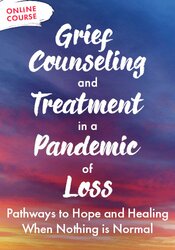Addressing Grief-Related Anxiety
Strategies for Normalizing Grief & Fostering Growth

When I went through the deaths of my parents, I didn't know where to turn. I didn't know what books to read or who to talk to. I didn't know how to grieve, so I didn't for a long time. I tried to push away my grief, and it bubbled out in depression, anxiety, and relationship troubles. I really struggled to find a place in my life for my grief. I kept pushing forward, and my grief kept spilling out in different places.
One of the biggest places my grief appeared was in the form of anxiety. I started having panic attacks shortly after my mother died. I ended up in the ER, my heart racing. For a long time, I just struggled with my anxiety, not linking it to the loss of my parents.
It was not until some college classes that I started to learn about trauma and grief. I realized my anxiety was linked to going through so much loss at such a young age.
Around 2010, I wrote an article for Slate called "Anxiety: The Missing Stage of Grief." I got more emails and letters than from any of my talks or books. So many people wrote to me and said, “Is this real, this connection between grief and anxiety?” My office filled up with people suffering from grief and anxiety, and it was something I began to study.
When we go through a big loss, we have this reminder that things aren’t up to us. This can cause an enormous amount of anxiety. I see this for people who have never gone through a loss and then go through a very significant loss: a close family member, a close friend, a spouse. It makes the world feel completely different, and not knowing how to navigate this new world can bring up a lot of anxiety.
These new emotions can show as panic attacks or outbursts of anger. How do you go from your regular life to incorporating all these emotions stemming from your grief? It's hard to figure out where to turn, and it can cause a lot of anxiety. People can get anxious about going into a social situation, worried that they’ll have a grief attack, start crying in the middle of a presentation, or have an angry outburst. Just worrying about these things can cause even more anxiety.
The new or deepened fear of mortality is a part of it. As much as we know that life comes to an end at some point, we often operate as though it doesn't. We're not great, particularly in Western culture, about talking about the end of life, embracing it, and preparing for it. When someone dies unexpectedly, it reminds us that we are mortal and we're not going to be here forever.
Inadequate processing of grief is a major factor as well. I can't tell you how many clients have come to me years after a big loss, having tried everything not to process their loss. That led them to pushing down everything and having it spill out in other places.
The important thing about anxiety is that it is possible to work on it, to diminish it, to get your hands around it and get some control over it. When we don't, it becomes quite insidious. It builds and builds and becomes this big loop of anxiety that we get stuck in, and it can be very debilitating.
So how is grief-anxiety different from general anxiety?
It's linked specifically to the grief. Your client may have never been anxious before or had normal amounts of anxiety, and then they went through a significant loss and started having panic attacks. They may have had a certain level of anxiety throughout their life, but after a loss it’s been exacerbated. Your client will likely have a lot of anxiety about death, excessive ruminations around death, anxious attachments in relationships, and avoidance of their grief.
When I begin to work with an anxious client who has gone through a major loss, these are the first steps I take:
This is an adapted excerpt from Claire Bidwell Smith's keynote at the PESI Grief Summit. Click here to access the self-study course.
One of the biggest places my grief appeared was in the form of anxiety. I started having panic attacks shortly after my mother died. I ended up in the ER, my heart racing. For a long time, I just struggled with my anxiety, not linking it to the loss of my parents.
It was not until some college classes that I started to learn about trauma and grief. I realized my anxiety was linked to going through so much loss at such a young age.
Around 2010, I wrote an article for Slate called "Anxiety: The Missing Stage of Grief." I got more emails and letters than from any of my talks or books. So many people wrote to me and said, “Is this real, this connection between grief and anxiety?” My office filled up with people suffering from grief and anxiety, and it was something I began to study.
When we go through a big loss, we have this reminder that things aren’t up to us. This can cause an enormous amount of anxiety. I see this for people who have never gone through a loss and then go through a very significant loss: a close family member, a close friend, a spouse. It makes the world feel completely different, and not knowing how to navigate this new world can bring up a lot of anxiety.
These new emotions can show as panic attacks or outbursts of anger. How do you go from your regular life to incorporating all these emotions stemming from your grief? It's hard to figure out where to turn, and it can cause a lot of anxiety. People can get anxious about going into a social situation, worried that they’ll have a grief attack, start crying in the middle of a presentation, or have an angry outburst. Just worrying about these things can cause even more anxiety.
The new or deepened fear of mortality is a part of it. As much as we know that life comes to an end at some point, we often operate as though it doesn't. We're not great, particularly in Western culture, about talking about the end of life, embracing it, and preparing for it. When someone dies unexpectedly, it reminds us that we are mortal and we're not going to be here forever.
Inadequate processing of grief is a major factor as well. I can't tell you how many clients have come to me years after a big loss, having tried everything not to process their loss. That led them to pushing down everything and having it spill out in other places.
The important thing about anxiety is that it is possible to work on it, to diminish it, to get your hands around it and get some control over it. When we don't, it becomes quite insidious. It builds and builds and becomes this big loop of anxiety that we get stuck in, and it can be very debilitating.
So how is grief-anxiety different from general anxiety?
It's linked specifically to the grief. Your client may have never been anxious before or had normal amounts of anxiety, and then they went through a significant loss and started having panic attacks. They may have had a certain level of anxiety throughout their life, but after a loss it’s been exacerbated. Your client will likely have a lot of anxiety about death, excessive ruminations around death, anxious attachments in relationships, and avoidance of their grief.
When I begin to work with an anxious client who has gone through a major loss, these are the first steps I take:
This is an adapted excerpt from Claire Bidwell Smith's keynote at the PESI Grief Summit. Click here to access the self-study course.
Be Prepared To Treat Grief and Loss with Confidence

Final farewells over FaceTime, drive-by burials, Zoom funerals... The pandemic has forced us to mourn loved ones in an unnatural and numbing way: alone. Without contact and comfort from others... Without the rituals we’ve used for millennia to mourn... An alarming amount of grief is being prolonged and unresolved. The mental and emotional impacts have yet to be understood...
But we do know that unresolved grief increases the risk of anxiety, depression, substance use, and post-traumatic stress disorder. The impact of this pandemic of grief will linger for years... Making grief treatment a significant part of all future caseloads.
That’s why we’ve brought together some of the biggest names and leading trainers in the field for this online self-study grief summit. Join world-renowned grief expert David Kessler, acclaimed author Claire Bidwell Smith, and six of our most accomplished grief trainers. They’ll guide you in overcoming the most demanding challenges of working with grief today.
But we do know that unresolved grief increases the risk of anxiety, depression, substance use, and post-traumatic stress disorder. The impact of this pandemic of grief will linger for years... Making grief treatment a significant part of all future caseloads.
That’s why we’ve brought together some of the biggest names and leading trainers in the field for this online self-study grief summit. Join world-renowned grief expert David Kessler, acclaimed author Claire Bidwell Smith, and six of our most accomplished grief trainers. They’ll guide you in overcoming the most demanding challenges of working with grief today.
Meet the Expert:
Claire Bidwell Smith, LCPC, worked as a therapist specializing in grief for over a decade and is the critically acclaimed author of three books of nonfiction: The Rules of Inheritance (Penguin, 2012), After This: When Life is Over Where Do We Go? (Penguin, 2015) and Anxiety: The Missing Stage of Grief (Da Capo, 2018).
The Rules of Inheritance is a coming-of-age memoir of a young woman forging ahead on a journey of loss that humbled, strengthened, and ultimately healed her. It has been published in 18 countries and is currently being adapted for film. Claire’s work has been celebrated by mental health advocates like Maria Shriver and New York Times bestselling author Cheryl Strayed.
Claire has written for various publications including The New York Times, The Huffington Post, Salon.com, Slate, Chicago Public Radio, The Guardian, Psychology Today, and Yoga Journal.
Learn more about their educational products, including upcoming live seminars, by clicking here.
The Rules of Inheritance is a coming-of-age memoir of a young woman forging ahead on a journey of loss that humbled, strengthened, and ultimately healed her. It has been published in 18 countries and is currently being adapted for film. Claire’s work has been celebrated by mental health advocates like Maria Shriver and New York Times bestselling author Cheryl Strayed.
Claire has written for various publications including The New York Times, The Huffington Post, Salon.com, Slate, Chicago Public Radio, The Guardian, Psychology Today, and Yoga Journal.
Learn more about their educational products, including upcoming live seminars, by clicking here.
Topic: Anxiety/Depression | Grief
Tags: Advice | Anxiety | Grief | How To | Loss | Strategies | Video





